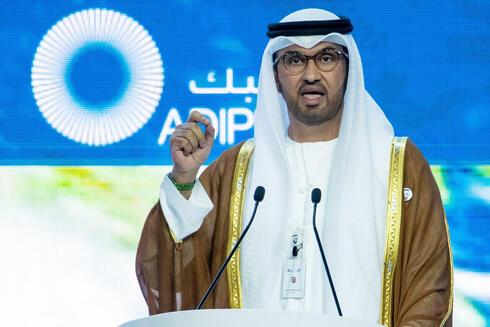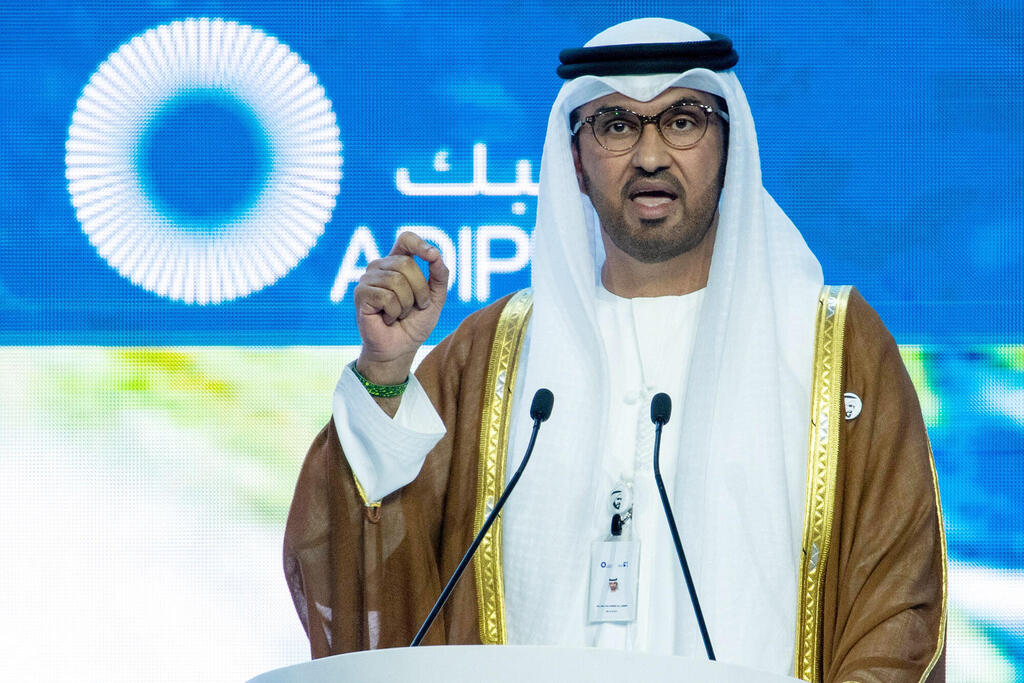
Freezing of New Med Energy deal by Abu Dhabi can only be thawed by ending Gaza war
Public criticism over the UAE’s continuing close relations with Israel pushed the Abu Dhabi government to freeze the purchase of 50% of New Med Energy alongside BP, something that can only be reversed with an end to the fighting
The freezing of the proposed 50% stake acquisition of Israel’s New Med Energy to British Petroleum (BP) and Abu Dhabi National Oil Company (ADNOC) came as little surprise to those following regional geopolitical developments since October 7th. The announcement by New Med Energy, reported to the Tel Aviv Stock Exchange on Wednesday, serves as a reminder of the ongoing impact of the war in Gaza on Israel's regional standing and especially its economy.
1 View gallery


Sultan al-Jaber, UAE minister of industry and advanced technology and head of ADNOC.
(Credit: Ryan LIM /AFP)
Days after Hamas’ attack on October 7th and the outbreak of war in Gaza, BP said that they and ADNOC remained committed to the deal and expected to proceed, although they were asked to revise their initial offer of about NIS 14 billion ($3.9 billion). However, as time passed and tensions escalated, and as the death toll in Gaza continued to rise, it became clear that the UAE government would not be able to sign the agreement until the war ends and a sustainable agreement regarding Gaza is reached.
Since the beginning of the war, the Emirati government has faced intense public scrutiny for maintaining close relations with Israel and refraining from publicly criticizing it, unlike other Arab countries who have also signed treaties with Israel, such as Egypt and Jordan. This criticism has been particularly strong on social media. Despite the importance of relations with Israel to the Emirati government, it is unable to completely ignore the narrative fueled by images and videos depicting the worsening plight of Gazans. In fact, since October 7th, several social media campaigns have been launched urging boycotts of Emirati products due to its relationship with Israel.
There is additional criticism directed at the UAE by neighboring Iran, raising concerns that one of its proxies, likely the Houthis, may decide to attack the UAE as they have in the past. As a result, the UAE would have difficulty explaining the billion dollar purchase of an Israeli company at this time.
To a large extent, the Arab world’s criticism of the UAE is unjustified. Since October 7th, the UAE has been one of the Arab countries most significantly aiding Gazans. The government has funded the establishment of a field hospital in southern Gaza, providing a range of services to the wounded, and has set up water pumping stations for Gaza residents. In recent days, the UAE has also been mentioned as playing a significant role in transferring aid to Gaza through the maritime corridor between Cyprus and Gaza initiated by President Joe Biden.
ADNOC did not rush to respond publicly to New Med Energy's announcement of the deal freeze, nor did the UAE press delve into the subject. ADNOC made headlines for a completely different reason following its decision to begin preliminary work on establishing a liquefied natural gas export terminal in an industrial area in Abu Dhabi, which the company says will be the first in the Middle East to operate fully on clean energy.
Despite the deal's freeze, this isn’t the end of the story. ADNOC still seeks significant activity in the natural gas market in the Eastern Mediterranean. This was indicated just over a month ago when the company and BP announced the establishment of a joint energy project focusing initially on the development of natural gas assets in Egypt. Although neither company mentioned the New Med Energy deal when launching the new project in February, its establishment was a clear sign of their intention to deepen their involvement in the Eastern Mediterranean. The conclusion of the war in Gaza will allow them to also unfreeze the deal with New Med Energy and take another significant step in that direction.













